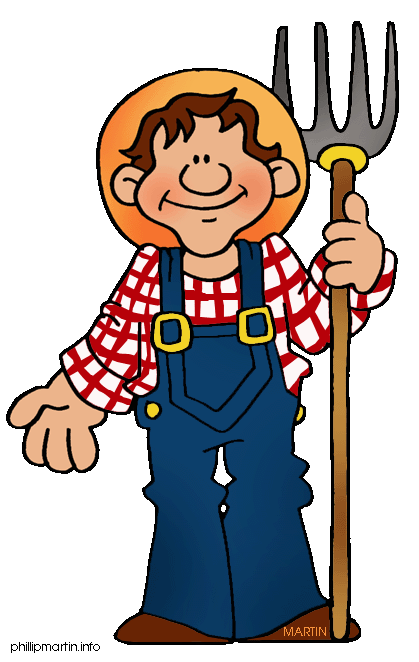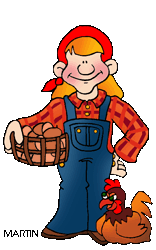|
Webster's 1828 Dictionary definition of agriculture: In general sense, the cultivation of the ground, for the purpose of producing vegetables, and fruits, for the use of man and beast; or the art of preparing the soil, sowing and planting seeds, dressing the plants, and removing the crops. In this sense, the word includes gardening, or horticulture, and also the raising and feeding of cattle, or stock. But in a more common and appropriate sense, it is used to signify that species of cultivation which is intended to raise grain and other crops for man and beast. It is equivalent to husbandry. Agriculture is the most general occupation of man. |
||
"Hi Kids, I have been asked to talk about the basics of American agriculture. Agriculture is really the industry of growing and caring for plants and animals. It is the science of growing food for people, but it also included growing flowers, trees, grass or turf and landscaping lawns. So agriculture really includes anything that grows. Agriculture goes beyond growing food it also includes marketing what is grown and than processing it for people to eat. When learning about agriculture you will hear terms such as husbandry, horticulture, agronomy, animal husbandry, and hydroponics, so the best way to learn about agriculture is to learn the language of an agriculturalist. Click Here To Go To The Glossary of Agricultural Terms."
|
||
|
||
|
What Is Farming: We looked at what is farmer is, now let's look what farming is.
Farming is really growing food. It begins with knowing what must be done, knowing how to do it and than doing it right so the farmer can grow healthy plants and livestock so they can produce healthy nutritious grain, vegetables, fruit, meat and milk. It doesn't matter whether you are planting corn or wheat or growing grass for the cows farming begins with the soil. The soil must be prepared before the seed can be planted. The soil may need to be plowed or cultivated. Fertilizer may need to be applied. Farming is applying the right herbicide at the right time to control weeds. It is applying the right pesticide to control the bugs that may infest his crops. Farming is watching crops and livestock grow and working to avoid possible problems that may come about and doing what needs to be done when a problem does arise. Farming is not just growing grain, fruits, vegetables, meat and milk. Is is knowing when his crops and livestock are ready to go to the market. Knowing when to sell and how to sell is the ultimate goal of farming. So farming is knowing what food to grow, knowing how to grow it, knowing how to sell it and than doing everything right.
|
||
|
Check out this article by Suzanne Tanner Of Able Safety Transformative Tech: How Technology Is Helping Small Farms Distribute |
||
 Agriculture
really begins with the soil.
Agronomy is the branch of
agriculture that deals with soil health. Agriculture
really begins with the soil.
Agronomy is the branch of
agriculture that deals with soil health. |
||
|
Story of Farming (historylink101.com) Farming Agriculture Growing Food (basicknowledge101.com)
|
||
| Farming Equipment | ||
|
|
||
|
|
||
|
|
||
|
Agriculture4kids * Tom May * P.O. Box 111, Port Jefferson OH 45360-0111 * Email: tom@agriculture4kids.com * Phone: 937-507-9413 |
||
|
|


 What is a farmer?
What is a farmer?